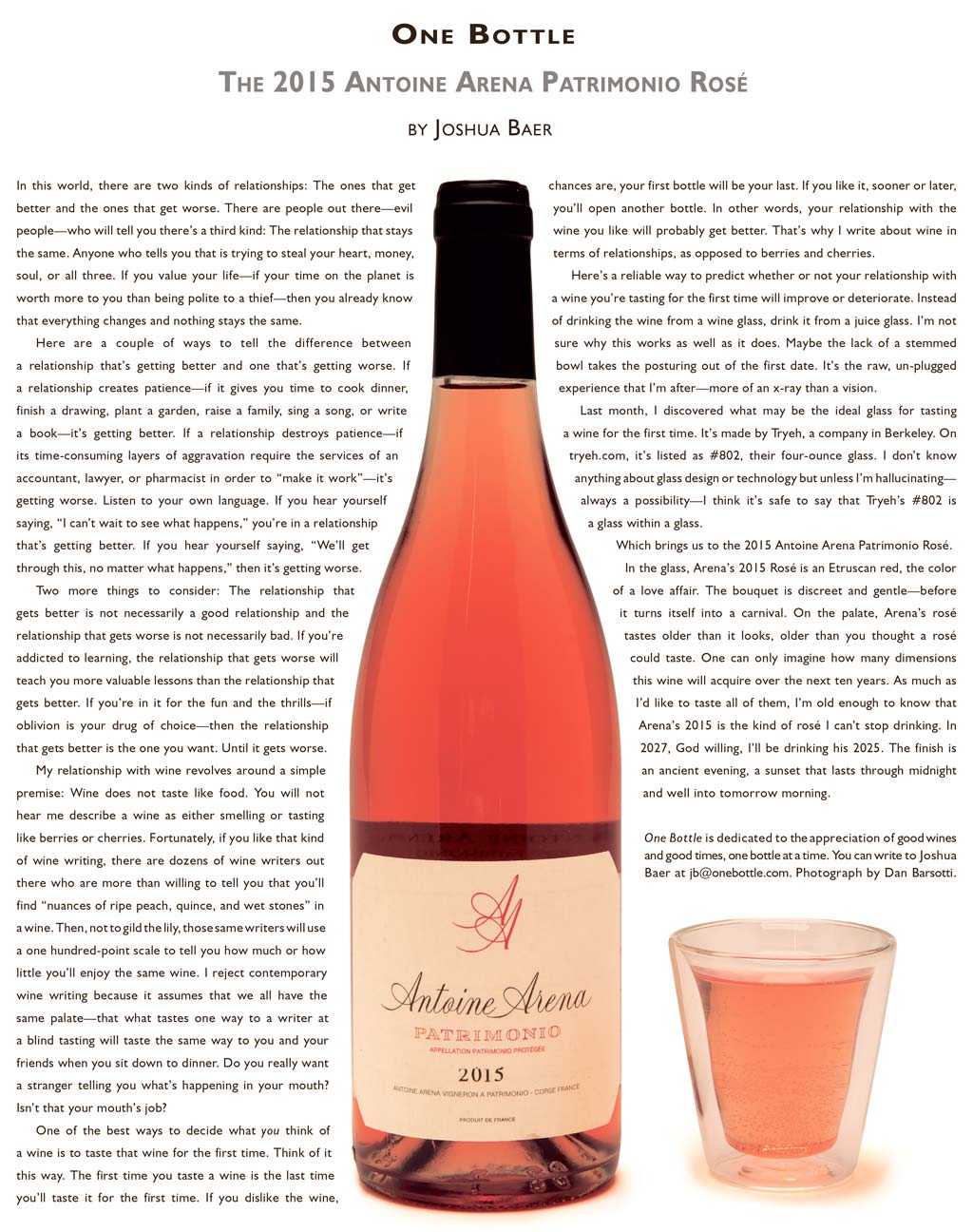2015 Antoine Arena Patrimonio Rosé
In this world, there are two kinds of relationships: The ones that get better and the ones that get worse. There are people out there—evil people—who will tell you there’s a third kind: The relationship that stays the same. Anyone who tells you that is trying to steal your heart, money, soul, or all three. If you value your life—if your time on the planet is worth more to you than being polite to a thief—then you already know that everything changes and nothing stays the same.
Here are a couple of ways to tell the difference between a relationship that’s getting better and one that’s getting worse. If a relationship creates patience—if it gives you time to cook dinner, finish a drawing, plant a garden, raise a family, sing a song, or write a book—it’s getting better. If a relationship destroys patience—if its time-consuming layers of aggravation require the services of an accountant, lawyer, or pharmacist in order to “make it work”—it’s getting worse. Listen to your own language. If you hear yourself saying, “I can’t wait to see what happens,” you’re in a relationship that’s getting better. If you hear yourself saying, “We’ll get through this, no matter what happens,” then it’s getting worse.
Two things to consider: The relationship that gets better is not necessarily a good relationship and the relationship that gets worse is not necessarily bad. If you’re addicted to learning, the relationship that gets worse will teach you more valuable lessons than the relationship that gets better. If you’re in it for the fun and the thrills—if oblivion is your drug of choice—then the relationship that gets better is the one you want. Until it gets worse.
My relationship with wine revolves around a simple premise: Wine does not taste like food. You will not hear me describe a wine as either smelling or tasting like berries or cherries. Fortunately, if you like that kind of wine writing, there are dozens of wine writers out there who are more than willing to tell you that you’ll find “aromas of ripe peach, quince, and wet hay” in a wine. Then, not to gild the lily, those same writers will use a one hundred-point scale to tell you how much or how little you’ll enjoy the same wine. I reject contemporary wine writing because it pre-supposes that we all have the same palate—that what tastes one way to a writer at a blind tasting will taste the same way to you and your friends when you sit down to dinner. Do you really want a stranger telling you what’s happening in your mouth? Isn’t that your mouth’s job?
One of the best ways to decide what you think of a wine is to taste that wine for the first time. Think of it this way. The first time you taste a wine is the last time you’ll taste it for the first time. If you dislike the wine, chances are, your first bottle will be your last. If you like it, sooner or later, you’ll open another bottle. In other words, your relationship with the wine you like will probably get better. That’s why I write about wine in terms of relationships, as opposed to berries and cherries.
Here’s a reliable way to predict whether or not your relationship with a wine you’re tasting for the first time will improve or deteriorate. Instead of drinking the wine from a wine glass, drink it from a juice glass. I’m not sure why this works as well as it does. Maybe the lack of a stemmed bowl takes the posturing out of the first date. It’s the raw, un-plugged taste that I’m after—more of an x-ray than a vision.
Last month, I discovered what may be the ideal glass for tasting a wine for the first time. It’s made by Tryeh, a company in Berkeley. On tryeh.com, it’s listed as #802, their four-ounce glass. I don’t know anything about glass design or technology but unless I’m hallucinating—always a possibility—I think it’s safe to say that Tryeh’s #802 is a glass within a glass.
Which brings us to the 2015 Antoine Arena Patrimonio Rosé.
In the glass, Arena’s 2015 Rosé is an Etruscan red, the color of a love affair. The bouquet is discreet and gentle—before it turns itself into a carnival. On the palate, Arena’s rosé tastes older than it looks, older than you thought a rosé could taste. One can only imagine how many dimensions this wine will acquire over the next ten years. As much as I’d like to taste all of them, I’m old enough to know that Arena’s 2015 is the kind of rosé I can’t stop drinking. In 2027, God willing, I’ll be drinking his 2025. The finish is an ancient evening, a sunset that lasts through midnight and well into the morning.
One Bottle is dedicated to the appreciation of good wines and good times, one bottle at a time. You can write to Joshua Baer at jb@onebottle.com.
